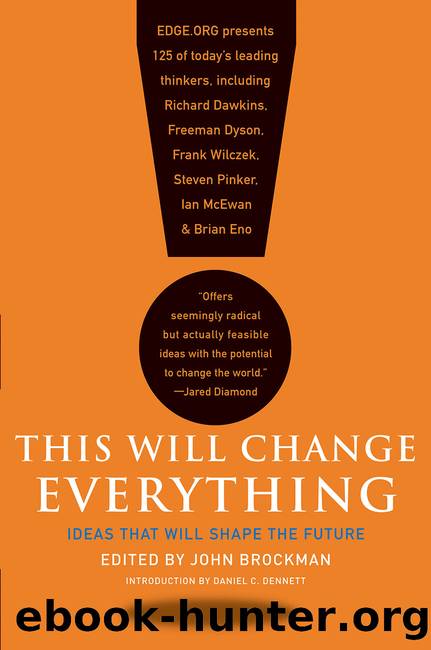This Will Change Everything by John Brockman

Author:John Brockman [Brockman, John]
Language: eng
Format: epub
Publisher: HarperCollins
Published: 0101-01-01T00:00:00+00:00
THE USE OF NUCLEAR WEAPONS AGAINST A CIVILIAN POPULATION
LAWRENCE KRAUSS
LAWRENCE KRAUSS is a physicist at Arizona State University and the author of Hiding in the Mirror: The Quest for Alternate Realities.
âThe release of atom power has changed everything except our way of thinking.â So said Albert Einstein sixty-four years ago, following the Hiroshima and Nagasaki bombings at the end of World War II. Forced to choose a single game changer, I have turned away from the fascinating scientific developments I might like to see and will instead focus on the one game changer I hope I will never witness but nevertheless expect will occur during my lifetime: the use of nuclear weapons against a civilian population.
Whether used by one government against the population of another or by a terrorist group, the detonation of even a small nuclear explosiveâsimilar in size, for example, to the one that destroyed Hiroshimaâwould alter the economies, politics, and lifestyles of the first world in a way that would make the effects of the 9/11 attacks seem trivial. I believe that the possible use of nuclear weapons remains one of the biggest dangers of this century. It is remarkable that more than sixty years have passed without their use, but the clock is ticking. I fear that Einsteinâs admonition is just as true today as it was then and that we are unlikely to go another half-century with impunityâat least without confronting the need for a global program of disarmament that goes far beyond the current Nuclear Non-Proliferation and strategic arms treaties.
Following forty years of Mutual Assured Destruction, with the two superpowers like two scorpions in a bottle, each held at bay by the certainty of the destruction that would occur at the first whiff of nuclear aggression on the part of the other, we have become complacent. Two generations have come to maturity in a world where nuclear weapons have not been used. The Nuclear Non-Proliferation Treaty has been largely ignored, and not just by nascent nuclear states like North Korea or India or Pakistan or pre-nuclear wannabes like Iran. Together, the United States and Russia possess twenty-six thousand of the worldâs twenty-seven thousand known nuclear warheadsâthis in spite of the NNPTâs strict requirement for these countries to significantly reduce their arsenals. Each country has perhaps a thousand warheads on hair trigger full alertâeven though there is currently no strategic utility associated with such a posture.
Ultimately, what concerned Einstein, and is of equal concern today, is that first use of nuclear weapons cannot be justified on either moral or strategic grounds. Nevertheless, it may surprise some people to learn that the United States has no strict anti-first-use policy. In fact, in its 2002 Nuclear Posture Review, the United States declared that nuclear weapons âprovide credible military options to deter a wide range of threats,â including âsurprising military developments.â
While we spend $10 billion a year on flawed ballistic missile defense systems against nonexistent threats, the slow effort to disarm means that thousands of nuclear weapons remain
Download
This site does not store any files on its server. We only index and link to content provided by other sites. Please contact the content providers to delete copyright contents if any and email us, we'll remove relevant links or contents immediately.
Enlightenment Now: The Case for Reason, Science, Humanism, and Progress by Steven Pinker(7306)
A Journey Through Charms and Defence Against the Dark Arts (Harry Potter: A Journey Through…) by Pottermore Publishing(4811)
The Immortal Life of Henrietta Lacks by Rebecca Skloot(4581)
A Journey Through Divination and Astronomy by Publishing Pottermore(4379)
Elon Musk by Ashlee Vance(4122)
Origin Story: A Big History of Everything by David Christian(3687)
COSMOS by Carl Sagan(3618)
Alchemy and Alchemists by C. J. S. Thompson(3516)
Bad Pharma by Ben Goldacre(3422)
Enlightenment Now by Steven Pinker(3367)
Shadow of Night by Deborah Harkness(3361)
Inferior by Angela Saini(3311)
A Mind For Numbers: How to Excel at Math and Science (Even If You Flunked Algebra) by Barbara Oakley(3302)
Origin Story by David Christian(3195)
The Code Book by Simon Singh(3180)
Signature in the Cell: DNA and the Evidence for Intelligent Design by Stephen C. Meyer(3132)
The Elements by Theodore Gray(3051)
A Brief History of Time by Stephen Hawking(3022)
A Journey Through Potions and Herbology (A Journey Through…) by Pottermore Publishing(2851)
